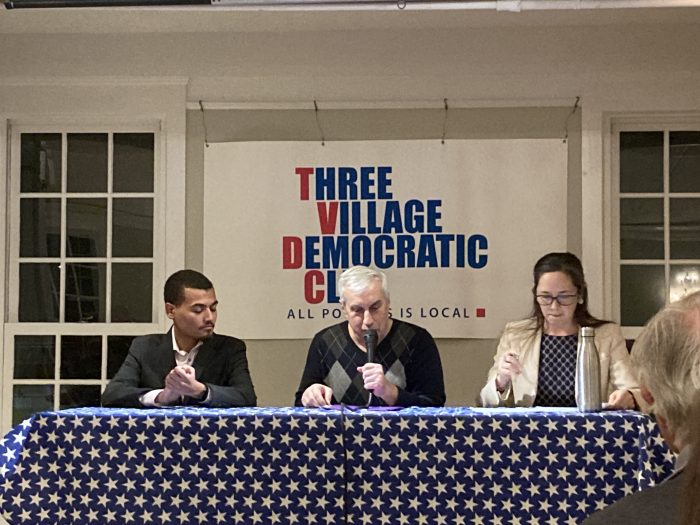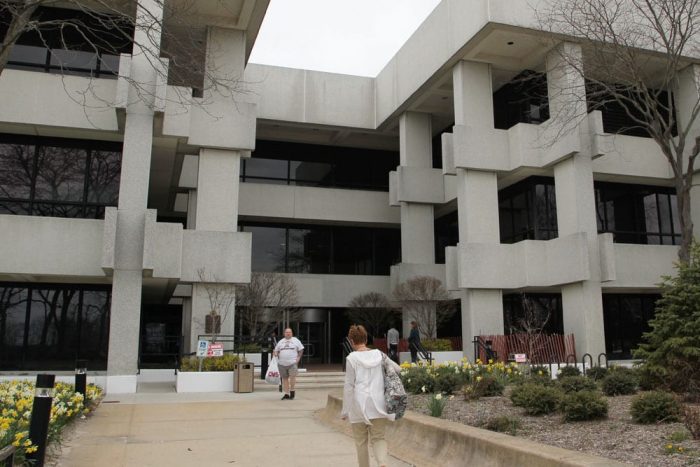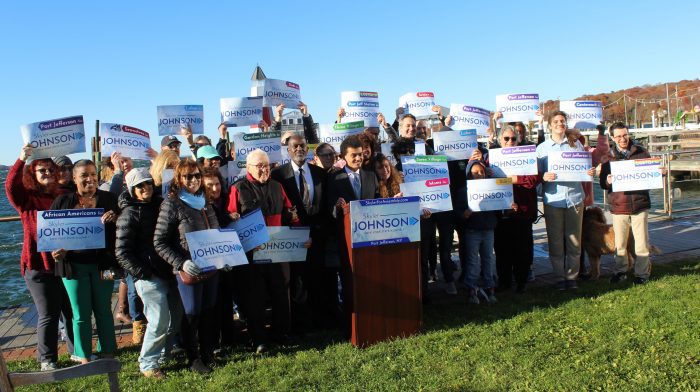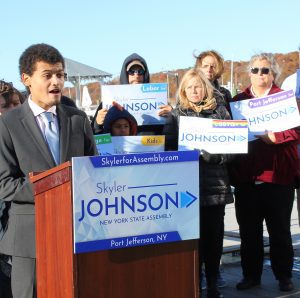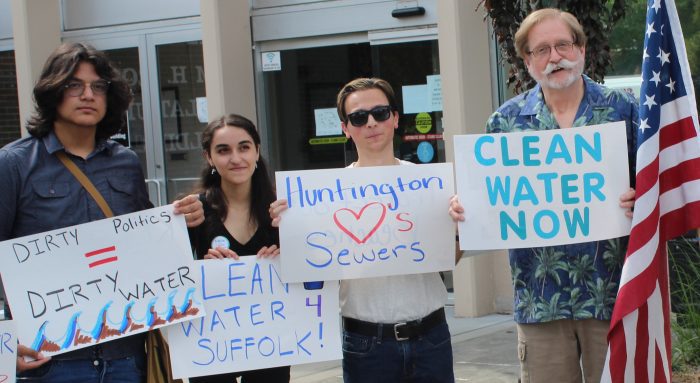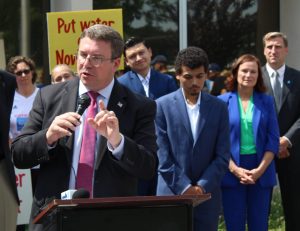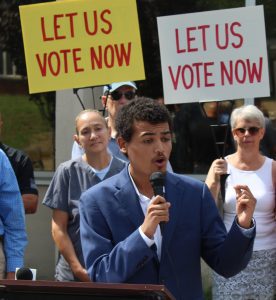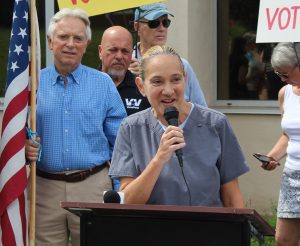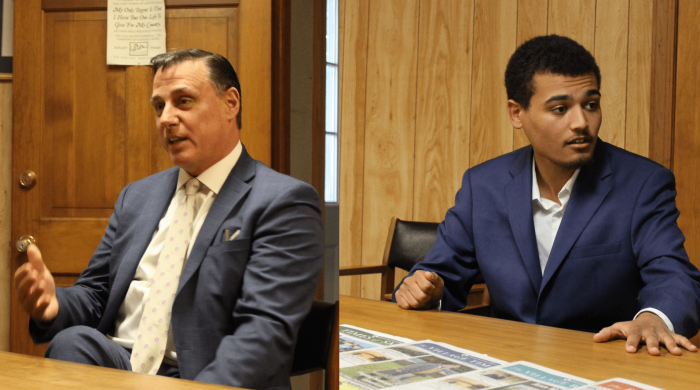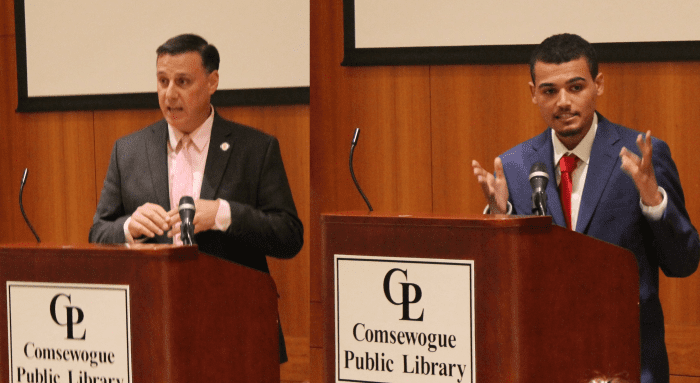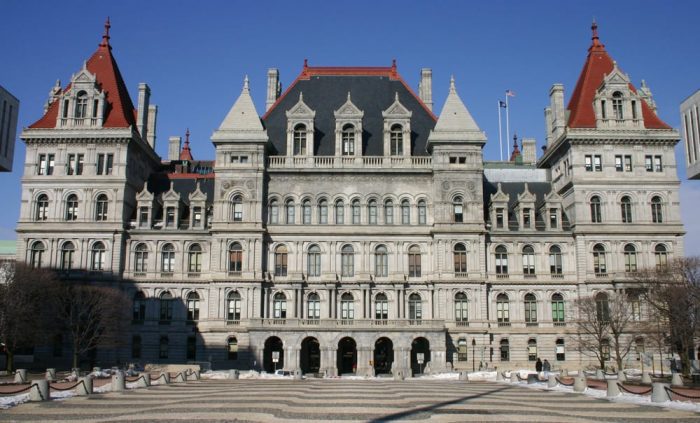In the race for New York’s 1st state Senate District, incumbent Sen. Anthony Palumbo (R-New Suffolk) is competing against Democratic Gen Z challenger Skyler Johnson of Mount Sinai.
In an office debate, these two candidates offered their perspectives on assorted topics affecting this area.
Introductions
Palumbo has served in elective office for nearly a decade, first in the state Assembly and later in the Senate, where he is completing his first term. He is also a practicing criminal defense attorney.
Johnson currently sits on the board of Temple Beth Emeth of Mount Sinai. Before pursuing state office, he worked under Southampton Village Mayor Jesse Warren and now works for the Brentwood-based nonprofit New Hour for Women & Children – LI, a program for reentry services for formerly incarcerated women and their families. If elected, he would be the youngest person to serve in the state Legislature since Theodore Roosevelt.
LIRR electrification
Electrification of the Port Jefferson Branch line is an area of agreement for the two state Senate candidates. Johnson intends to use his office to apply direct pressure on the MTA-LIRR to get there.
“I’d like to make sure that we’re bringing home funds for the MTA, making sure that the project is properly funded, as well as making sure that there is enough transparency in the process,” he said. “I want to make sure that I’m communicating with environmental and transit advocacy groups to get them involved and make sure that from the public side, they’re also putting pressure on the MTA.”
Palumbo said cleaning up the Lawrence Aviation Superfund site is nearly completed, after which serious deliberations can occur on electrification. “I think that would really get the ball rolling, and then it really does come down to funding,” he said. “I know many people have been clamoring for it. They’ve been asking about it. … It actually is ripe to do it at this point.”
Cost of living
In communities throughout the 1st Senate District, the area is simultaneously experiencing an exodus of residents from the region while encountering difficulties attracting new families. To counteract these trends, Johnson advocated confronting the various facets of the problem in their entirety.
“As a young person trying to invest in my future, trying to invest in my community, I can say that it is very hard to afford the cost of living here,” he said. “It is very hard to find anything remotely affordable to rent, buy or live in our community.”
When discussing the issue of declining student enrollment in school districts, Johnson further pressed this point: “Our schools are not going to seem attractive if people cannot actually get to them, if people cannot afford to buy within our communities,” he said.
Palumbo, on the other hand, said keeping families in the area requires supporting small businesses, which he called the “backbone of our economy.”
“Business owners are not going to operate their business at a loss,” he said. “They’re going to do what they can. Their margins are tight enough in this state. … I think that’s where it starts and, of course, affordable housing and all of those other issues.”
Elaborating upon this position, Palumbo supported cutting taxes on businesses and offering incentives to keep them in New York, including reducing the minimum wage.
“We’ve been doing what we can to help these small businesses get started, but I feel like it’s almost at the point where we need to give [them] a leg up,” the state senator said. “We need to create huge exemptions. … How about an exception for businesses with 10 or less employees?”
Drawing a clear distinction, Johnson said keeping the area populated starts with paying workers a fair wage. “We need to pay workers fairly,” he said. “I fully support the current minimum wage, and I want to make sure that we’re doing everything that we can to expand workers wages, not reduce them, because that doesn’t help anyone.”
While much of the conversation on housing surrounds renters, Palumbo said more opportunities to support buyers need to be in place. “It’s not always about renting,” he said. “It’s about affordable housing purchases,” adding that subsidizing first-time homebuyers “is huge.”
For Johnson, the problem has gradually compounded over time. “It is really not good that people cannot afford to buy, that people cannot afford to rent and that people cannot afford to stay here long term,” he said.
Environment
Throughout the 1st District, rising sea levels, increased flooding and intensifying storms threaten waterfront properties. In Johnson’s view, the problem is twofold. It first requires action on the part of the state to reinforce natural barriers to protect coastlines. However, these issues are part of a broader effort to reduce carbon emissions and counteract climate change.
“At the end of the day, this all ties into the fight against climate change,” he said. “It is all about investing in natural energy, doing everything we can to fight the effects of sea-level rise.”
For Palumbo, policymakers can work to resolve these matters through several initiatives. “The sea level is gradually rising,” he said. “There needs to be a big plan and, unfortunately, it’s going to take [money], and the government has to be fully committed, which I think we are in New York.”
For the erosion issue at East Beach bluff in Port Jefferson, Johnson said coastal resilience efforts are a matter of shoreline hardening, but saying there is not “a one-size-fits-all approach.”
“Unfortunately, there are going to be places where we need to retreat, where there’s not much else that we can do,” he said. “At the end of the day, I’m committed to investing in environmental infrastructure, in making sure that we’re fighting erosion, making sure that we are proactively having engineers who can examine the situations.”
Palumbo agreed with Johnson, stating that shoreline resiliency depends upon the project and should be evaluated case by case.
“There’s a balance that needs to be struck, of course, between what is reasonably feasible for the particular area,” the state senator said. “The bottom line is I do think it would depend on the project.”
Marijuana
With the statewide legalization of marijuana, there will be emerging debates over the future of the substance within communities. The candidates offered similar perspectives when asked whether there should be restrictions on the number of dispensaries and whether the plant should be grown in their district.
“I’m a less-government-is-more kind of guy,” Palumbo said. “There will be a lot of comments, no question, when that’s decided, and if at all, it should always be done with public input.”
He added, “It’s farming. It clearly is farming, but obviously, the nature of it is such that it’s not just like you’re farming corn. … I think siting is very important — where it’s going to be — and I think public input is extremely important.”
Johnson favored growing marijuana in the district, saying it could bolster the local economy and assist farmers.
“Moving forward, I think it would be beneficial to have some growth within our agriculture communities,” he said. “I think the funds that will come from that will be really important. I think that they could be used to invest into our roads, our infrastructure, into a lot of the programs that I want to see take place.”
Polarization/partisanship
Palumbo believes the problem of polarization in politics is further magnified in the age of social media. He advocates returning debates to matters of policy and removing personal attacks.
“I don’t think we need to be impolite, that we need to go after each other’s policies and not the other person,” he said. “I’ve always maintained that sort of a manner in conducting business, and I’m hopeful that we’re going to get back there, and we will.” He added, “I think that happens when we have a diversity of thought.”
Despite their differences on many policy grounds, Johnson thanked his opponent for his willingness to engage in a dialogue.
“Senator Palumbo, we disagree on a lot of things, but you’ve always been willing to have a conversation, and I appreciate that,” Johnson said. “I think maintaining an open dialogue is really important to creating bipartisanship, to working across party lines.”
He added, “Whoever of us wins, I think we will be able to have conversations across the aisle. I hope we can return to a place of civility.”
Voters will have the final word on these two candidates for state Senate District 1 on Tuesday, Nov. 8.



